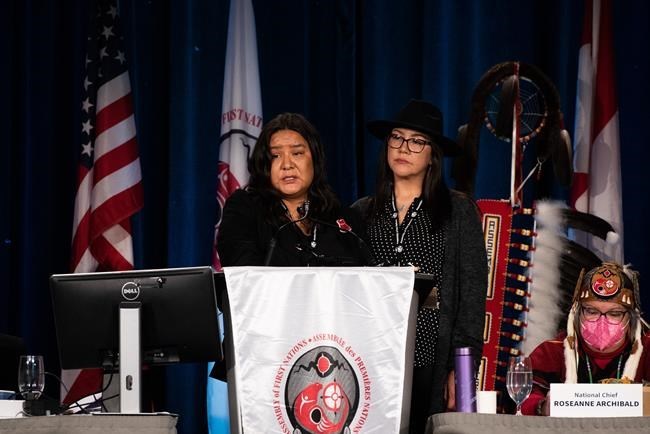OTTAWA — A First Nations child welfare
advocate on Wednesday implored chiefs to ensure "no child is left
behind" in a landmark $40-billion settlement agreement with the federal
government.

Osachoff, left, speaks as Melissa Walterson stands beside her during
the Assembly of First Nations special chiefs assembly in Ottawa on
Wednesday, Dec. 7, 2022. Chiefs at the assembly heard from the two women
about the harms caused by the child-welfare system and are expected to
vote on how the AFN should move forward with a landmark settlement. [THE
CANADIAN PRESS/Spencer Colby]
OTTAWA — A First Nations child welfare advocate on Wednesday
implored chiefs to ensure "no child is left behind" in a landmark
$40-billion settlement agreement with the federal government.
Cindy Blackstock delivered the message to an Assembly of First
Nations gathering in Ottawa, after being invited to take the stage by
Cindy Woodhouse, regional chief in Manitoba who helped negotiate the
agreement, which had been thrown into question since being rejected by
the Canadian Human Rights Tribunal.
The AFN, representing more than 600 First Nations across the country,
had asked the tribunal to approve the settlement deal, which would see
the government spend $20 billion to compensate families and children for
systemic discrimination in the Indigenous child welfare system.It would
also spend another $20 billion on making long-term reforms.
Blackstock, the executive director of the First Nations Caring
Society who first lodged the complaint at the heart of the issue, raised
concerns that the agreement wouldn't provide $40,000 in compensation to
all eligible claimants, which is the amount the tribunal ruled they
should get.
"We can make sure that in our First Nations canoe of justice, no
child has to see their money go away and no child is left behind in
justice," she said Wednesday.
"We are capable of that."
Following the tribunal's decision in October, the federal government filed for a judicial review of some parts of its decision.
Endorsing the settlement agreement loomed as one of the biggest items
on the assembly's agenda, with chiefs being asked to vote on what the
organization should do next.
The chiefs had been preparing to vote on conflicting resolutions,
with one asking them to support the final settlement agreement, while
another sought to see the organization not appeal the tribunal decision
and renegotiate the deal.
But on Wednesday, further talks between both sides took place,
assisted by former senator and judge Murray Sinclair, who helped the
AFN, federal government and lawyers for two related class-action
lawsuits reach the $40-billion agreement in the first place, which was
formally announced in January.
Chiefs ultimately voted late Wednesday against re-entering
negotiations but to instead support compensation for victims outlined in
the agreement and "those already legally entitled to the $40,000 plus
interest under the Canadian Human Rights Tribunal compensation orders."
It also included a provision that AFN leaders must regularly return
to chiefs to provide it with progress updates and "seek direction" from
chiefs on implementing the final agreement.
Many chiefs thanked Blackstock, who was greeted with applause after
further agreement was met and said she was honoured to see people come
together for children harmed by Ottawa's discrimination.
"We have had too many apologies, we've had too many compensation
deals, we've had too many kids hurt. And this has got to be it," she
said.
She added more discussion on the long-term reform part of the deal would be presented to chiefs on Thursday.
Earlier in the day, the assembly heard from sisters Melissa Walterson
and Karen Osachoff, plaintiffs on the case, about the impact the foster
care system had on their lives.
Osachoff said she had been in the child welfare system since she was born and didn't have a chance to grow up with her sister.
"Had it not been for the '60s Scoop and the child welfare (system), her and I would have grown up together."
She said she understands why the tribunal characterizes those like
her as "victims," but told chiefs to instead think of them as survivors.
"I am not a victim and our claimants are not victims."
This report by The Canadian Press was first published Dec. 7, 2022.






No comments:
Post a Comment
Please leave a comment.